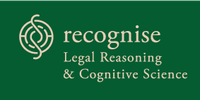
Unibo structure involved: Alma Mater Research Institute for Human-Centered Artificial Intelligence
Scientific manager: Corrado Roversi
Unibo Team: Sonia Ferrin
Project Web page: https://www.recognise.academy
Erasmus+ Action type: Cooperation for innovation and the exchange of good practices Strategic Partnerships for higher education
Project reference: 2020-1-IT02-KA203-079834
Start Date: 1 September 2020
End Date: 31 August 2023
Budget
Total: € 415,514
UNIBO: € 59,285
Coordinator: Università degli Studi di Palermo (IT)
Partners:
- Universidad De Alicante (ES)
- Uniwersytet Jagiellonski (PL)
- Alma Mater Studiorum - Università di Bologna (IT)
- Universiteit Maastricht (NL)
- Univerza V Ljubljani (SI)
Summary
In the last decades, cognitive science has deeply changed our understanding of human reasoning and decision making. As depicted by contemporary cognitive science, the human mind appears, first, as an intuition-driven device, making use of cognitive shortcuts (heuristics) which may easily lead to systematic cognitive distortions (biases); and, second, as an emotional device, whose apt reasoning and decision making, far from being the product of cool and disembodied cognition, relies on affective mechanisms grounded in the body.
This picture is at odds with the dominant approach, both normative and descriptive, to legal (and especially judicial) decision making. Adjudication, in the mainstream self-narrative, is still regarded as the realm of dispassionate reason and argumentation.
In the last decades, however, several research programs have been developed, aiming at updating our understanding of the “legal mind" on the basis of the contributions coming from cognitive science. “Emotions and the law”, “Heuristics and the law”, “Neuro-law”, “Law and Intuition”, “Law and embodied cognition”, have become central topics, and fortunate catchwords, in the academic debate. Moreover, cognitive models of legal reasoning have become increasingly important in order, first, to design AI systems mirroring reasonable legal decision making, and, second, to highlight constraints and limitations to which this activity is subject.
Despite its crucial importance, this body of knowledge is not part of the usual training of European lawyers. This is a serious gap in legal education, with significant consequences. Legal scholars and professionals usually lack even basic knowledge of the cognitive mechanisms governing legal reasoning and decision making, and of the most common biases and distorting factors that lead reasoning and decision astray. They are unaware of the personal and environmental conditions which increase the probability of falling prey of such cognitive distortions, and they lack knowledge of, and the ability to apply, cognitive strategies and techniques aimed at preventing them.
The main objective of RECOGNISE is to develop a training curriculum on legal reasoning and cognitive science filling this gap. The training will be targeted at newly graduated, post-graduates and Master students, PhD students, Post-doc researchers, teaching staff in Law Departments, as well as legal professionals (in particular, barristers and judges).
This objective will be achieved through the production of three intellectual outputs:
O1: a training curriculum on legal reasoning and cognitive science, articulated in three different formats: Intensive Study Program (5-10 days training); LLM Course (3-6 months training); E-learning Course (18 video-lectures);
O2: an online handbook, providing comprehensive and practice-oriented information on the relevant topics; the handbook will be freely accessible on the project's online platform;
O3: an online platform, which, besides gathering all the project's material, including the handbook, will contain the full-developed e-learning course.
Both the training format and the handbook are organized within a general framework articulated in six thematic units: 1. Heuristics and biases in adjudication; 2. Emotions and adjudication; 3. Intuition and legal reasoning; 4. The cognitive structure of legal concepts; 5. Defeasible reasoning, law, cognitive science; 6. Legal reasoning, cognitive science, Artificial Intelligence.
As intermediate steps in the development of the project, we plan to realize: (i) two Intensive Study Programs, the first in Ljubljana and the second in Palermo, with the collaboration of the local Bar Associations; (ii) a public presentation of the online platform, to be held in Maastricht.
At the end of the project, a final conference, to be held in Krakow, will summarize and disseminate the outcomes of the project.
The project consortium gathers six academic partners with excellent and complementary expertise on the addressed topics: the University of Palermo (leading organization), the Jagiellonian University of Krakow, the University of Bologna, the Maastricht University, the University of Alicante, the University of Ljubljana. In order to assure a tight exchange between theoretical and practical perspectives, two Bar Associations (Palermo's and Ljubljana's) will participate to the project as associated partners.
